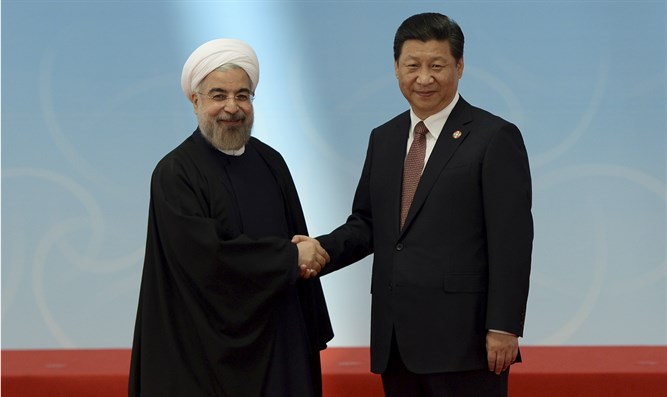New agreement would clear the way for billions of dollars of Chinese investments in Iranian energy and other sectors.
Iran and China have quietly drafted a sweeping economic and security partnership that would clear the way for billions of dollars of Chinese investments in energy and other sectors, The New York Times reported on Sunday.
The partnership, detailed in an 18-page proposed agreement obtained by the newspaper, would vastly expand Chinese presence in banking, telecommunications, ports, railways and dozens of other projects.
In exchange, China would receive a regular — and, according to an Iranian official and an oil trader, heavily discounted — supply of Iranian oil over the next 25 years.
The document also describes deepening military cooperation, potentially giving China a foothold in a region that has been a strategic preoccupation of the United States for decades.
It calls for joint training and exercises, joint research and weapons development and intelligence sharing — all to fight “the lopsided battle with terrorism, drug and human trafficking and cross-border crimes”, according to The New York Times.
The partnership — first proposed by China’s leader, Xi Jinping, during a visit to Iran
in 2016 — was approved by President Hassan Rouhani’s cabinet in June, Iran’s foreign minister, Mohammad Javad Zarif, said last week.
Iranian officials have publicly stated that there is a pending agreement with China,
and one Iranian official, as well as several people who have discussed it with the Iranian government, confirmed that it is the document obtained by The Times, which is labeled “final version” and dated June 2020.
It has not yet been submitted to Iran’s Parliament for approval or made public, stoking suspicions in Iran about how much the government is preparing to give away to China.
The move undercuts the Trump administration’s efforts to isolate the Iranian government because of its nuclear and military ambitions.
Since withdrawing from the 2015 nuclear deal between Iran and world powers, the US
has reimposed sanctions on Iran that were lifted as part of that deal.
The next challenge for the US is renewing a UN arms embargo on Iran which expires in October. US Secretary of State Mike Pompeo recently vowed to use all means available
to extend the UN arms embargo on Iran.
The United States has put forward a resolution to extend the embargo but faces opposition from veto-wielding Russia and China.
The New York Times noted that if put into effect as detailed, the partnership between Iran and China would create new and potentially dangerous flash points in the deteriorating relationship between China and the United States.
The Chinese investments in Iran, which two people who have been briefed on the deal
said would total $400 billion over 25 years, could spur still more US punitive actions against Chinese companies, which have already been targeted by the administration in recent months.
“The United States will continue to impose costs on Chinese companies that aid Iran,
the world’s largest state sponsor of terrorism,” a State Department spokeswoman wrote
in response to questions about the draft agreement.
“By allowing or encouraging Chinese companies to conduct sanctionable activities with the Iranian regime, the Chinese government is undermining its own stated goal of promoting stability and peace.”
(Arutz 7).
